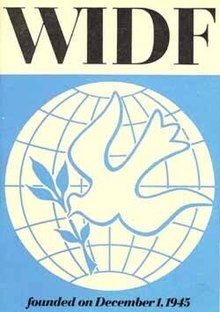
Back الاتحاد النسائي الديمقراطي الدولي Arabic Internationale Demokratische Frauenföderation German Παγκόσμια Δημοκρατική Ομοσπονδία Γυναικών Greek Federación Democrática Internacional de Mujeres Spanish Naisten kansainvälinen demokraattinen liitto Finnish Fédération démocratique internationale des femmes French Կանանց միջազգային դեմոկրատական ֆեդերացիա Armenian Federazione democratica internazionale delle donne Italian 国際民主婦人連盟 Japanese ქალთა საერთაშორისო დემოკრატიული ფედერაცია Georgian
 Original WIDF logo from its founding | |
| Abbreviation | WIDF |
|---|---|
| Formation | December 1945 |
| Type | NGO |
| Purpose | Association of World's Women Organizations |
| Headquarters | Paris→East Berlin |
Region served | Worldwide |
Official language | English, French, Russian, Spanish, Arabic, German, Portuguese |
The Women's International Democratic Federation (WIDF) is an international women's rights organization. Established in 1945, it was most active during the Cold War when, according to historian Francisca de Haan, it was "the largest and probably most influential international women's organization of the post-1945 era". Following the dissolution of the Soviet Union in 1991, its headquarters were moved from Berlin to Paris. In 2002, with the election of Márcia Campos as president, the office relocated to Brasília. Subsequently, in 2007 the WIDF secretariat was located in São Paulo. Since 2016, the president has been Lorena Peña of El Salvador. The WIDF's magazine, Women of the Whole World, was published in six languages: Arabic, English, French, German, Russian, and Spanish.
WIDF was founded in Paris in 1945 as an anti-fascist organization with the intent of engaging women in efforts to prevent war and to combat the racist and sexist ideology of fascist regimes. At its organizing conference, Eugénie Cotton was elected as president and the organization's goals were defined as promoting active participation in the fight against fascism and in favor of world peace, in protecting public health with particular focus on child welfare, in improving the status of women's rights, and in building internationalist friendships among women.
During the Cold War era, WIDF was described in recovered FBI files as Communist-leaning and pro-Soviet. The international day for protection of children, observed since 1950 in many countries as Children's Day on 1 June, was established on the initiative of a WIDF campaign held in 1949. In 1951, the organization was banned by French authorities and relocated to East Berlin. Other international women's organizations became concerned that WIDF would use appeals to rally participation in women's rights and motherhood as propaganda to increase anti-American sentiment and promote communism. At various points in its history, the WIDF enjoyed consultative status with the Economic and Social Council (ECOSOC) of the United Nations. It was as a result of proposals from WIDF representatives on the Commission on the Status of Women (CSW) that the United Nations declared 1975 as International Women's Year.
© MMXXIII Rich X Search. We shall prevail. All rights reserved. Rich X Search